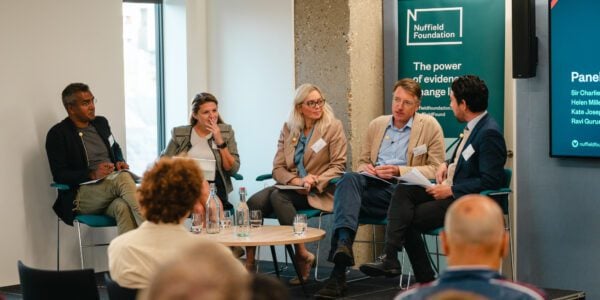Final report from the Nuffield Foundation and British Academy on the Understanding Communities programme
A new report exploring how local communities influence social well-being is published today by the Nuffield Foundation and the British Academy with findings from our joint Understanding Communities programme.
Launched in 2022, the initiative funded six research teams to investigate how communities can improve people’s lives and produced evidence-based policy and practice recommendations informed by lived experience.
This final report brings together the findings under four themes: place, trust, connection, and community capacity:
- Place – the importance of understanding and integrating demographic, geographic, and historical context for fostering strong, connected communities through locally initiatives and shared community spaces
- Trust – and its underpinning of social cohesion, within and between communities, with hyperlocal provision the most valued
- Connection – how communities that support a diverse set of social connections across difference are more likely to be cohesive. While digital technology can enhance connections, limited access and skills risk excluding some people from accessing services
- Community capacity – is hindered by a lack of physical, social and cultural infrastructure, as well as public sector provision, is strongly dependent on local volunteers and needs sustainable, secure funding to thrive
The six projects also developed a range of proposals for national and local policymakers focusing on how local authorities should invest in community spaces and people, co-design services and spaces with residents, and deliver locally where possible, while central government needs to improve approaches to funding, provide guidance which prioritises strengthening communities, and facilitate community asset ownership.
In tandem, the Institute for Community Studies has published an analysis of the Understanding Communities programme, which provides insights into the programme and offers recommendations for undertaking community-based research.
To develop and sustain thriving communities, policymakers must invest for the long term – not just in facilities, but in the people who bring them to life and make projects successful. Both local and central government should adjust their approach to funding, towards sustainable support for grassroots organisations. They should also ensure communities are actively involved in shaping services, drawing on their in-depth understanding of local population, geography, and history.Alex Beer, Assistant Director of Strategy, Nuffield Foundation
Dr Molly Morgan Jones, Director of Policy at the British Academy, said: “Social ties between people and their communities have long been a vital source of wellbeing and belonging. As socioeconomic inequalities deepen, it is more urgent than ever to understand how these ties are sustained and what policymakers can do to reinforce them. This programme, developed through an important collaboration with the Nuffield Foundation, shows that communities thrive when we are able to understand the conditions which enable them to connect, build trust and strengthen capacity within their local places. We have been delighted to work with the Nuffield Foundation on this important programme and are grateful to the Foundation for their support and collaboration which has made this programme possible.”







